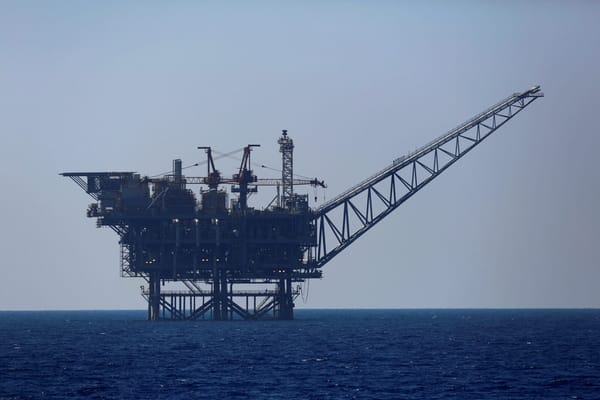From Oslo to Offshore—The Rise of Energy Normalization in the Eastern Mediterranean


When US President Donald Trump’s first administration unveiled its “Peace to Prosperity” plan in January 2020, the glossy document promised Palestinians a share in regional growth.
Part of its vision was an Eastern Mediterranean Energy Hub anchored in Egypt, designed to coordinate gas development and boost exports from the region’s recently discovered offshore fields. The language echoed a century of Zionist claims that prosperity would follow economic cooperation and that Palestinians, in particular, would benefit.
The false promise of economic prosperity in exchange for Arab recognition of a Jewish state in Palestine has a long history. In 1919, Haim Weizmann, representing the interests of the World Zionist Organization, signed an agreement with Faisal Ibn Hussein, representative of the newly formed Arab government in Damascus, stating that the Zionist movement would “use its best efforts to assist the Arab State in providing the means for developing the natural resources and economic possibilities.”[1] Fierce opposition by the Syrian congress (presided over by Faisal) meant the agreement never materialized. But had it survived, and based on later developments, it would have led to political normalization and economic dependency rather than the economic development it promised. In Mandatory Palestine, under British control from 1920, Zionists impoverished and dispossessed Arab peasants and farmers, culminating in the expulsion of over 750,000 Palestinians during the 1948 Nakba. Zionists also sought to control the land and water resources of surrounding Arab territory.
Following the establishment of a Zionist state in 1948, its belligerence—coupled with the rise of Arab socialism and anti-colonial movements across the region—put off any possibility of official normalization, whether political or economic.[2] Several states enshrined economic boycotts into law after the Arab League issued a trade boycott decree in 1954. The Camp David Accords between Israel and Egypt in 1978 were a turning point in the opposite direction. But their economic footprint, compared to their geopolitical consequences, remained limited.
It was not until the first Oslo Accords of 1993 that the logic of economic prosperity as a pillar of normalization—and its expansion on a regional and global scale—became widespread. Concluded by Israel and the Palestine Liberation Organization in the wake of Soviet collapse and the apparent triumph of neoliberalism, the Oslo Accords and addenda, as well as the normalization treaty with Jordan signed one year later, included economic promises that aligned with the principles of pax-Americana. The text of the first Oslo Accord’s Declaration of Principles refers explicitly to development of Palestinian and regional economies as a “Marshall Plan.” Free markets and light industrial production would presumably lift the economies of the Palestinian Occupied Territories from the doldrums and boost the economic growth of Arab normalizing states, namely Jordan and Egypt.
In the two decades that followed, however, not a single infrastructural project possessing a semblance of economic sovereignty—such as air or sea ports—came to fruition in Palestine. Meanwhile, the West Bank economy lost billions of dollars according to World Bank figures, became heavily aid-dependent and served as a source of cheap labor and a commodity market for Israeli goods.[3]
Regionally, Washington led the establishment of Qualifying Industrial Zones (QIZ) in Jordan and Egypt in 1996 and offered incentives such as duty-free access to US markets to encourage the joint production of materials between Israel and the two Arab states. Ultimately, these zones were largely limited to textile production. They became areas of labor exploitation with little monetary return for the Arab states and eventually lost their incentive when the United States signed free-trade agreements with Jordan and Egypt in the early 2000s. The rise of the Boycott, Divestment, Sanctions (BDS) movement in the same period, coupled with popular disapproval of trade normalization, led to further containment of commodity trading between Israel and Arab markets.
The political and economic pressure on Arab countries to normalize relations with Israel experienced a quantum leap early this century with the discovery of large oil and gas deposits in the Eastern Mediterranean. Beginning in the 2010s, large-scale investment in natural gas extraction by consortia of oil corporations (including US, European and Israeli companies), as well as pipeline diplomacy led by US envoys such as Amos Hochstein, worked to fully integrate Israel’s natural gas infrastructure into surrounding Arab states and the larger Mediterranean basin.
The turn to energy integration marked a decisive shift. While past attempts at so-called prosperity-for-peace promised development but delivered dependency, energy normalization represents a deeper structural problem. Energy deals that bind Arab economies to Israel through fuel and infrastructure for indispensable utilities are harder to resist or reverse.
Energy deals that bind Arab economies to Israel through fuel and infrastructure for indispensable utilities are harder to resist or reverse.
In Jordan, a 2016 bilateral deal worth an estimated $10 billion, locked the country into importing Israeli extracted gas. Jordan’s reliance on gas for power undercut the push toward solar power, despite having the ideal climate for it: Plans for large-scale solar fields were shelved in 2019 under the pretext of avoiding overgeneration. Meanwhile, Jordan’s National Electric Power Company, a public utility, poured billions of dollars into Israeli gas purchases, diverting precious monetary resources from much needed public investment in a country suffering from high levels of unemployment and public debt (117 percent of GDP in 2025).
In Egypt, energy normalization faced an early hiccup. Initially, natural gas flowed from Egypt to Israeli markets in 2008. In the wake of the 2011 popular uprisings, protests against the cheap export of Egyptian gas to Israel forced it to come to a standstill. But the suspension was short-lived. Following the counter revolution in 2013, President Abdel Fattah al Sisi’s government quickly restored energy links, albeit in reverse. In 2018, Cairo and Tel Aviv signed a treaty to export Israeli-excavated offshore gas to Egypt. The deal—worth $15 billion over ten years—proposed using the Arab Gas Pipeline, which was originally built across Egypt, Jordan and Syria in the early 2000s and celebrated as a means of Arab economic cooperation. It was now being used to pump what is effectively stolen Palestinian natural gas across historical Palestine’s coastline back into Egypt for export or local consumption.
In Lebanon, the political economy of energy normalization took a more coercive form. After the country’s financial collapse in 2019, Washington pressured Lebanese authorities, promising them an exemption from the sanctions imposed on Syria under the 2019 Caesar Act should they buy electricity from Jordan, which would be routed across Syria. That electricity was at least partly generated by stolen Palestinian gas expropriated using Israeli infrastructure.
At the same time, the United States pressed Lebanon to meet long-standing Israeli demands: disarm Hizballah and delineate the border. In return, US officials promised to secure agreements with foreign gas corporations willing to drill off Lebanon’s coastline. In 2022, tensions escalated when disputes over gas fields in the south brought Hizballah and Israel to a near military confrontation. The Islamic Resistance responded by threatening Israeli offshore drilling fields, a move intended to strengthen Lebanon’s negotiating position. The standoff led to a compromise: Maritime borders were officially drawn, but the land borders between Lebanon and northern occupied Palestine were left unresolved. Some among Lebanon’s political elites hailed the deal as a breakthrough that would reverse the country’s financial fortunes and help pay its mounting debts. But that relief never materialized. The French energy company TotalEnergies stalled in submitting its reports, and the outbreak of active war after October 7, 2023, halted any hopes of reaping revenue from offshore gas fields.
Notably, the Lebanese maritime deal was brokered by Amos Hochstein. A former Israeli soldier and special envoy to Lebanon in 2024, Hochstein personifies the fusion of private capital and state interests in shaping global energy politics. Previously a member of the lobby group Cassidy and Associates, Hochstein later served as Washington’s special envoy on global energy security under President Barack Obama’s, and later President Joseph Biden’s administrations. His official mandate was “to combat the use of energy resources for political leverage”—doublespeak that in practice meant securing such leverage for the United States to the exclusion of other powers.[4]
In that position, Hochstein oversaw the implementation of energy-related sanctions on Iran and other so-called rogue states while promoting the Southern Gas Corridor, a pipeline stretching from Baku—capital of Israel’s ally Azerbaijan—to Western Europe via Turkey, Greece and Italy. Prior to the Russian invasion of Ukraine in early 2022, Hochstein explicitly identified the Eastern Mediterranean as a potential alternative source of gas that “can play a role in freeing” central and southeast Europe from excessive dependence on Moscow. Hochstein also encouraged the energy industry to take advantage of cost-reducing technological innovations in natural gas production in order to sustain its production alongside renewable energy, rather than as part of a transition to renewables.
Energy normalization took on an institutional character with the formation of the East Mediterranean Gas forum. Established in 2020, the forum includes Egypt, Jordan, Cyprus, Greece, Italy, Israel and the collaborationist Palestinian Authority. Turkey’s exclusion reflects its tension with Israel over economic hegemony in the region. These energy rivalries also partly explain the alignment of regional forces in various conflicts, for example Turkey’s intervention in Libya, which is home to large gas and oil reserves.
Since 2010, the discovery of fossil fuels in commercial quantities in the Eastern Mediterranean has not only triggered battles over energy resources but accelerated Israel’s economic integration into the region—at the expense of the economic and political interests of the Palestinians and surrounding Arab populations.
Several lessons follow. For one, the dangers of energy normalization may outweigh the normalization of other economic relations. The monetary stakes are higher and energy is a strategic commodity. Unlike consumer goods, it is indispensable for modern living: Power and fuel shortages can paralyze entire communities and shut down production. It is also harder to track. Unlike consumer goods, energy is not visibly traceable to a clearly identified source, such as a manufacturer. It is purchased and provided through infrastructural grids that are not subject to individual boycotts and are hard to replace even at a collective level. And energy imports do not require constant marketing. They are legitimated by a one-time deal that is renewable and, as a result, creates long-term dependency.
Multinational corporations play a role in drilling and extraction, but these deals cannot proceed without legal frameworks, security guarantees and state concessions. Analyses that reduce energy politics to either abstract materiality or the logic of global capitalist interests risk missing the regional political structures of control and regulation that make such deals possible. Normalization and sanctions are not opposites but two sides of the same Western imperialist policy. The violent dynamics of redrawing maps in order to align political geographies with capitalist economic interests is an imprint of colonialism. Yesterday’s railways are today’s pipelines. Sovereignty, therefore, becomes a central facet of resistance.
The political economy of energy normalization also stretches far beyond the Eastern Mediterranean and is tied to energy wars in Eastern Europe and Central Asia. One key motive of the Gas Forum in securing Eastern Mediterranean reserves is to delink Europe from Russian gas. But other initiatives, such as a recently announced supply of Qatari-funded Azerbaijanian gas to Syria, are also part of the political puzzle. Given Baku’s close alliance with Israel, this project represents yet another attempt to integrate Arab energy infrastructures with Israel and its allies. Gulf capital, in this case Qatar, plays a decisive role, amplifying the large-scale push of normalization, kickstarted with the Abraham Accords and reinforced by Arab media funded by Gulf capital, outlets such as Saudi Arabia’s Al Arabiya.
All of these dynamics unfold on the shores of a settler colony. From Weizmann’s 1919 promise of prosperity to Trump’s Peace to Prosperity plan a century later, Zionist colonialism has consistently wielded economic instruments to serve political ends, above all the creation and preservation of a Jewish supremacist state. Israel’s genocide in Gaza offers the most violent reminder of this fact. The attempted extermination of Gaza’s population cannot be solely—or even primarily—explained by the desire to securitize the eastern shores of the Mediterranean for energy extraction purposes, but energy politics form part of the infrastructure that sustains it. Solidarity with Gaza therefore requires centering the struggle for Palestinian national liberation, while confronting the underlying capitalist and imperialist forces that stand in the way.
[Hicham Safieddine is associate professor and Canada Research Chair in History of the Modern Middle East at the University of British Columbia.]
[1] United Nations, “The Question of Palestine,” Text of the Faisal-Weizmann Agreement, January 3, 1919.
[2] Abed el-Razzak Takriti and Hicham Safieddine, “Arab Socialism,” in The Cambridge History of Socialism (Cambridge University Press, 2023).
[3] Tawfiq Haddad, “How did the Economic Dimensions of ‘Peace’ and Normalization Pave the Way for the Genocide of Gaza?” Al-Sifr, June 17, 2025.
[4] “Amos J Hochstein Official Biography,” US Department of State, Archived Content from 2009–2017.
Hicham Safieddine, "From Oslo to Offshore—The Rise of Energy Normalization in the Eastern Mediterranean," Middle East Report 315/316 (Summer/Fall 2025).








